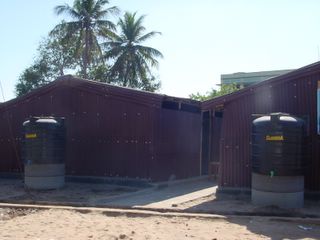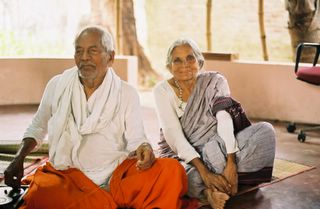Let's Beat the Drums!: Motivating and Mobilizing (D. Willis)
But what is most important for Amma is to put everything in perspective. As she says, for the poor there is a tsunami every day.
“I won’t give anything for free. You come and sit and work. For yourself. Make bricks!” Amma explains her perspective. There should be some kind of work for self-help, making bricks or building homes being the most apparent at this time. There are also struggles against temple lands, or so-called benami lands held in other people’s names to avoid the land ceiling laws, as well as the devastation of prawn farms.
Amma describes her work of the moment, of which there are many projects. Symbiosis wherever possible seems to be one important goal. For example, waste lands that have lain fallow and become covered with weeds and thorn forests can be cleared after they have been transferred to LAFTI, the wood obtained then being used to fire bricks that have been made for houses.
Her current projects include trying to get more lands from Sikkal Temple, a large temple in the area. She always has her eyes and ears open searching for lands that are being wasted or hoarded. With enough of the right kind of persuasion she has been able to get the titles of these lands transferred to LAFTI. In turn she does not simply give lands to those in need but enlists them in her Army of Compassion to build homes, clear other lands, and do other jobs.
Before starting this work it is important to get the workers motivated, too, and she later brings one of here workers who is a musician and song-writer to sing for us. Hard-driving village-oriented music meant to inspire: “Let’s beat the drums! Let’s change the huts! Beat the drum for the land revolution! Poverty and caste must go away! Thatched roof mud huts must go! Your hands must do it!”
“First we have to motivate them,” she says. “Then we mobilize their manpower. We mobilize them, and not just with money. We make it in their self-interest, and before
starting work we have self-help groups. It is also not just food-for-work: 75% rice and 25% money. Practice, local practice using local materials and know-how is then utilized as a strong foundation.”
For Amma there are two kinds of work that LAFTI is doing: Movement Work and Constructive Work. The Movement Work is about protests against the ecologicaldamage of prawn farms and so on, largely led by Appa. The Constructive Work having to do with houses, lands, and crafts are what Amma has been working with. With both of these, organizing people’s power is the key. We notice, too, that one of the key points of Amma’s approaches is to deeply involve the women in what is happening. With them and with the people she works with in general, there are great psychological needs to be appreciated, to be given dignity and respect, to be honored as human beings, all of which have been left out in the traditional society. Amma puts into practice this approach as the base for her work.
Later in the morning we accompany her to a remote brick-making site. We spend the morning with the workers there, talking with them and taking their pictures. Amma is busy talking with individuals about their particular stories.
More soon!
The Other David



0 Comments:
Post a Comment
<< Home